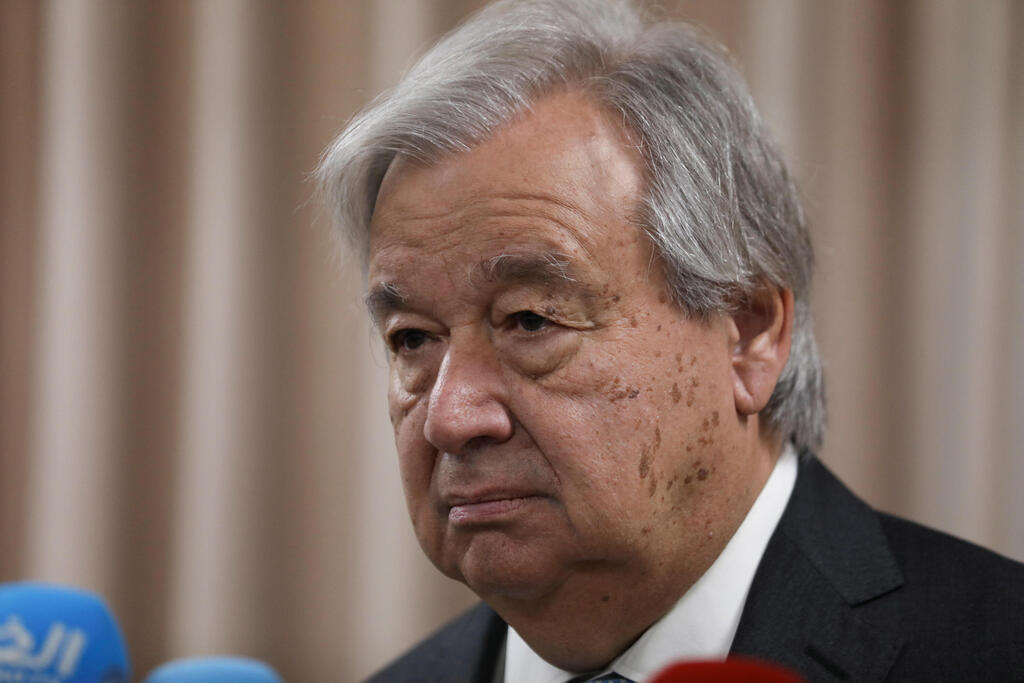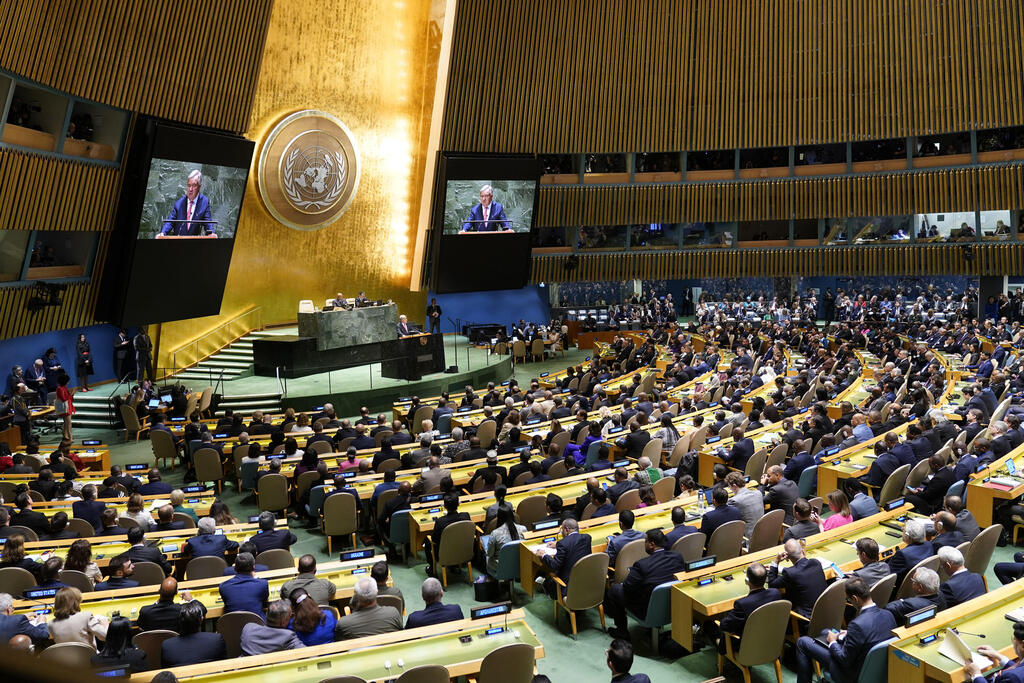Getting your Trinity Audio player ready...
UN Secretary-General Antonio Guterres has informed IDF Defense Attaché in the U.S., Major General Hidai Zilberman, of his final decision to include Israel in the blacklist of countries and organizations that harm children in conflict zones. This list also includes Russia, as well as terrorist groups such as ISIS, Al-Qaeda and Boko Haram.
According to a report on Hebrew-language Channel 13 News Thursday evening, Israel's efforts to persuade Guterres to avoid this move have failed, and Israel will appear on the blacklist to be published next week as part of a report distributed to UN Security Council members.
UN Secretary-General Antonio Guterres: Oct 7 attack did not happen in a vacuum
(Video: United Nations)
Although an official announcement from the secretary-general has not yet been made, Jerusalem understands that the decision is final, and a discussion on the report will take place on June 26.
Last month, Israeli officials voiced serious concern about this development due to Guterres' increasing criticism of Israel. Various sources familiar with the matter said, "The current secretary-general is anti-Israel and can no longer be influenced." According to these sources, "Including Israel on the blacklist is highly problematic and could lead to countries imposing an arms embargo on Israel."
The report, published annually and covering the previous year, is written by the UN Special Representative for Children and Armed Conflict Virginia Gamba. The current report will cover all of 2023, with a notable increase in data due to the events of October 7.
Last year's blacklist included Afghanistan, Colombia, Congo, Iraq, Mali, Myanmar, Somalia, Sudan, Yemen and Syria, along with terrorist groups Al-Qaeda, ISIS, Al-Shabaab and Boko Haram. A significant change last year was the inclusion of Russia's armed forces in the report.
Guterres will not explicitly mention Israel or the IDF but will refer to "Israeli security forces." Israel will find itself among non-democratic countries and will be the first democratic nation included in the report, which covers conflict zones worldwide and devotes about two pages to Israel as a chapter within it.
3 View gallery


UNRWA school struck by IDF in the Nuseirat refugee camp, central Gaza
(Photo: Bashar TALEB / AFP)
Until this year, the report dedicated a chapter to Israel and the Palestinians, but Israel had never been included in the blacklist titled "Parties that have not taken sufficient steps to improve the protection of children." The UN has documented the number of casualties but without practical consequences. The report's data comes from UN organizations and field sources, not from the parties involved.
Israel has criticized the process, arguing that the numbers on the Palestinian side are inflated. From the Palestinian perspective, even 18-year-old terrorists are counted as children and Palestinian victims, a categorization Israel vehemently disputes.
The consequences of being added to the blacklist are primarily reputational, as the report garners significant international attention and is cited across UN bodies, including the General Assembly, the Security Council and the International Criminal Court in The Hague.
Practically, once a state or entity is added to the list, a mechanism is established to produce specific reports on them. The office of the Special Representative will need to prepare dedicated reports on Israel, which will then be provided to the Security Council's working group on children in conflict zones. This working group can make recommendations that the Security Council may adopt, potentially through resolutions outlining expectations for Israel. For other countries, being on the blacklist can fuel negative initiatives such as boycotts, delegitimization, trade disruptions, and arms embargoes.
'Recruitment of minor informants and killing of thousands of children'
In a draft received by Israel several months ago, the UN attributed responsibility to Israel for actions violating international law concerning the harm to children. The draft included allegations of using large-scale bombings in built-up areas, imposing a severe blockade on Gaza, and attacking critical humanitarian infrastructure, including UN facilities, schools, hospitals and water and sanitation installations.
The draft also accused Israel of attempting to recruit minors as "informants" and claimed that security forces used children for self-protection. However, the draft did not address the use of children as human shields by Hamas and Islamic Jihad, nor did it mention the extensive rocket fire by Hamas targeting Israeli civilian areas, including kindergartens, hospitals and schools. Additionally, Israel is accused of killing six minors in Lebanon, but the draft fails to provide any context regarding Hezbollah's attacks on Israel and the damage they cause.
The draft also includes references to violations allegedly committed by settlers against Palestinian children. It further accuses Israel of blocking humanitarian aid to Gaza, without mentioning the hostages who are denied access to such aid. The draft levels serious allegations of killing thousands of Palestinian children and injuring thousands more, with 20,000 claims of violations related to children, 459 claims of attacks on schools and 326 claims of attacks on hospitals.
Despite the numerous accusations, there are some positive notes in the draft. Virginia Gamba, the UN Special Representative for Children and Armed Conflict who authored the report, acknowledged the crimes of October 7 concerning the harm to children. The draft details the methods of murder to highlight their severity and includes references to allegations of sexual and gender-based crimes. Additionally, explicit responsibility is attributed to Hamas and Islamic Jihad, with claims of 3,900 violations against Israeli children.
Despite the numerous allegations against Israel, the secretary-general is including Israel in the blacklist based on what the UN has allegedly verified regarding both the West Bank and Gaza, according to Security Council parameters for assessing child protection: the high number of children killed or injured in Gaza by bombings; killing, maiming (injury), recruitment of minors, bombings of schools, bombings of hospitals and attacks on humanitarian aid workers, as well as the prevention of humanitarian aid. These are the parameters established by the Security Council for evaluating child protection.
Israel has responded to the draft, saying it is unaware of any attempts by the IDF or security forces to recruit minors as informants and that this allegation should be removed unless evidence is provided. Israel also refutes the claim of using children as human shields as false and unfounded. Israel protested that the report does not include the use of civilians, including minors, as human shields by Hamas, nor does it mention that Hamas fires rockets from civilian areas, near schools and hospitals, which is the main reason these areas are at risk during combat.
Israel also contends that the draft report does not detail Hamas' use of kidnapped Israeli minors as human shields. Additionally, Israel requests that the report note that some child casualties were caused by errant Hamas rockets.
Regarding allegations against settlers, Israel argues that the draft presents a misleading and inaccurate portrayal and that Israel actively works to prevent and enforce the law against isolated extremists who act violently. Concerning accusations of harming children in Lebanon, Israel claims the report is one-sided and expects it to include a detailed account of Hezbollah's severe violations, including attacks on hospitals, schools and rocket fire at civilian populations.








